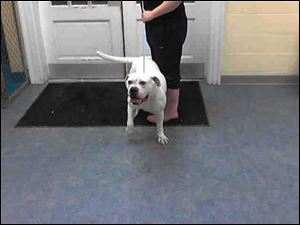
Giving up dog to county could mean pet’s death
Behavior tests determine which animals are adoptable, which will be killed
2/16/2014
Diamond was killed earlier this month after failing her behavior test.
Dog owners who make the decision to surrender their pets to area shelters do so for a variety of reasons but they may not be aware that their pets could be killed.
On Jan. 29, Toledo-resident Charles Harris surrendered his 5-year-old white American bulldog, Diamond, to Lucas County Canine Care & Control. He said she was a good dog, friendly and well-loved by those who knew her. He surrendered her to the county shelter because his increased work schedule meant he was away from home six to seven days a week, often for 10 hours or more at a time.
“I couldn’t give her the care I wanted to,” Mr. Harris said. “I didn’t want to give her up and I thought about it a lot. I hated to do it.”
Mr. Harris had considered selling her through classified ads, but he knew doing so would put Diamond at risk for being used for dog fighting because of her powerful breed. So he took her to the county shelter, where he thought she could be adopted out to a new family.
“I was trying to do the right thing,” Mr. Harris said.
Diamond was killed last Sunday after shelter staff said she showed potential aggression toward other dogs during a behavior test that all dogs must undergo if they are to be considered for adoption. Diamond’s evaluation on Feb. 4 showed she rushed at the other dog with a stiff body, her tail and head held tall and ears erect, which are considered concerning behaviors.
Lucas County Canine Care & Control Director Julie Lyle said that because Diamond’s breed is considered of the “pit-bull” type, her unfriendly behavior toward other dogs meant she could not go up for adoption, despite not showing overt aggressiveness such as lunging, growling, or trying to bite. Ms. Lyle said the dog’s breed and behavior also meant she was not likely to be taken in by another rescue, so she was killed by injection.
Mr. Harris said Diamond had not been around other dogs much but did play with the occasional stray and did not seem to be bothered by other dogs while out on walks.
He said that when he surrendered Diamond, he was not made aware that she would undergo behavior testing or that if she did poorly on some portion of the evaluation, she could be killed.
“I wouldn’t have wanted that,” he said, adding that if he had known, he likely wouldn’t have surrendered her to the county and would have found another way to get Diamond a new home.
The county dog pound operates under a local policy to accept all owner-surrendered dogs. Ms. Lyle said the shelter can never guarantee that a dog can be adopted or transferred. Shelter staff will inform owners that there are no promises but do not necessarily address the behavior testing or possibility of their dogs being killed specifically unless the owner asks.
“In most cases, there is a conversation, but we don’t have a script we follow,” Ms. Lyle said. “We give them the best, honest answers we can. Some people just don’t want to hear it.”
Ms. Lyle noted that the staff will offer owners the chance to discuss potential behavioral problems with the shelter’s trainer before making the final decision and surrendering a dog.
“Most people, by the time they get to a shelter, they’re done,” she said. “They’re not looking for advice anymore and they’ve made their decision.”
The Toledo Area Humane Society is an open-admissions shelter, meaning it will take in all animals and will not turn their owners away. Executive Director Gary Willoughby said staff members routinely attempt to help the owner with any problems so they may keep their pets.
“We will try to counsel them before they make the final decision,” he said. “But if they’ve made the decision, we don’t want them to just discard the pet.”
Owners are informed that their dogs must undergo medical and behavioral evaluations to determine if they could be put up for adoption. Staff members also make owners aware of the possibility their pet could be killed if ultimately deemed unadoptable, whether that decision comes right away or further down the road after fostering or training.
“We let them know we have to evaluate the animal, and if it does have behavioral issues that can’t be corrected, we’re less likely to put it up for adoption,” Mr. Willoughby said. “It’s case by case. Every animal’s situation is different.”
Ms. Lyle noted that some dogs may behave perfectly around their owners and in familiar surroundings but may act entirely different after being surrendered.
“A lot of people think their dog will be fine and would be surprised that it doesn’t do well,” she said. “But we ultimately can’t adopt out dogs that show aggression.”
Contact Alexandra Mester: amester@theblade.com, 419-724-6066, or on Twitter @AlexMesterBlade.